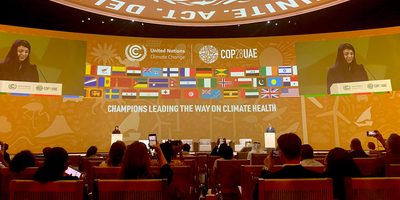
Mobilising communities for building resilient health and environment partnerships
On December 11th, ahead of Universal Health Coverage (UHC) Day 2023, The George Institute hosted a panel discussion titled, Mobilising communities for environmental action and Universal Health Coverage: Building resilient health and environment partnerships, as part of the annual symposium of the National Institute for Health and Care Research (NIHR) Global Health Research Centre (GHRC) for Environmental Change and NCDs. Partners and collaborators gathered in Indonesia one year after its launch at COP27 to engage in dialogue and reflect on progress, including planned activities for 2024 and to participate in a series of capacity strengthening activities.
The panel discussion was chaired by Professor Christopher Millett co-principal investigator of the NIHR GHRC, and convened experts in public health, environmental change, and community empowerment to discuss action-oriented steps for building resilient health and environment partnerships; also providing a platform to reflect on whether the 28th Conference of Parties (COP28) created an enabling environment for inclusive participation and decision making as the final negotiations ensued. Panellists discussed innovations in the NCD-climate intersection ecosystem and learnings from community engagement approaches adopted in their work.
Professor Millett underscored the pivotal role of health systems in reducing greenhouse gas emissions while advancing UHC, for instance by leveraging telehealth for remote healthcare delivery to minimise environmental impact and eliminating inefficient healthcare practices that are wasteful of natural resources. Millett highlighted the necessity for stronger resilience during extreme weather events, especially to protect vulnerable communities, and emphasised the fundamental importance of robust primary health care systems. These systems, grounded in collaborative efforts across sectors and with communities, provide effective, affordable, and equitable healthcare, aligning with the Sustainable Development Goals (SDGs) and commitments in the Alma Ata Declaration.
What was achieved for health at COP28?
The first Health Day at COP marked a significant milestone in acknowledging the interconnectedness of the climate crisis and its impact on health. It was a crucial step toward humanising the issue and recognising its toll on human lives. However, the focus now must shift to ensuring that promises made translate into tangible actions at the national level. This involves leveraging support, particularly through the Alliance for Transformative Action on Climate Change and Health (ATACH), and addressing the root causes of the crisis, such as the burning of fossil fuels, to ensure equity and justice for all. COP28 was considered the most 'Inclusive COP.' However, yet despite the active involvement of young people in speaking roles at side-events and participating in live demonstrations, their presence in formal negotiations remains insufficiently represented.
“For us, success would be when health gets engrained in the negotiations. Countries and negotiators negotiate actions with health as a fundamental consideration, not just a co-benefit.” - Shweta Narayan, Global Climate and Health Campaigner, Healthcare Without Harm.
Making strides towards resilient health and environment partnerships
Katja Cic, sharing insights as the co-chair of the World Health Organization (WHO) Youth Council working group on Climate Change and Health, highlighted the significance of engaging in open and transparent dialogue with youth constituencies. She called for aligning ideas and initiatives implemented with the diverse needs of the global youth population, and for increased provision of education for not only youth, but people in positions of power. This investment is crucial to equip policymakers with an understanding of the importance of inclusive participation and how to cultivate spaces for meaningful engagement. She further reiterated the importance of being dynamic, ensuring that young persons have access to capacity-building resources and information, so they are equipped to take on roles in shaping our environment and health systems.
Susan Onyango spoke about her work with communities to address unequal gender roles, gaps in integrated services in primary health care, unhealthy food systems and limited health literacy in Homa Bay, Kenya. She expanded on the benefits of community engagement for increasing trust, and acceptance of decisions that subsequently result in commitments being translated into outcomes. Susan emphasised the necessity for early and comprehensive community engagement, involving leadership at all programming phases to encourage active participation in meeting their needs and aspirations, thereby fostering deeper, more trusting partnerships.
Shweta Narayan emphasised the significance of enhancing resilience by strengthening PHC and specifically recalibrating it to align with the evolving needs of communities experiencing marginalisation. She highlighted community engagement and a robust healthcare workforce as pivotal pillars essential for mitigating diverse risks linked to the climate crisis. Additionally, she stressed that these elements play a crucial role in breaking the health-climate siloes and uniting individuals with a purpose for action towards UHC.
Kristine Belesova, as a contributor, detailed her ambitions for the NIHR GHRC and its role in broadening the evidence-supporting interventions benefiting both human and planetary health, surpassing existing literature. She emphasised the need for identifying robust and new interventions that are acceptable to the community and thus sustainable once implemented.
Learn more
Learn more about the WHO Youth Council, and how the WHO is meaningfully engaging with young people as key agents of change in the pursuit to achieving UHC.
Read this article on the Healthy Women project, winner of the WHO NCD Labs in 2022.
Learn more about how the NIHR GHRC can contribute to attaining dual benefits of mitigating global environmental change and improving public health.
This blog was co-authored by Ravitej Prasad, Policy Manager, The George Institute India, and Claudia Selin Batz, Policy and Advocacy Advisor, UK and Multilaterals, The George Institute for Global Health.






